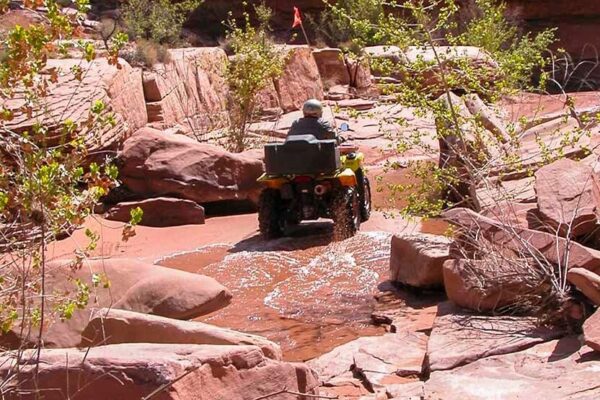As “war” wages over access to the Grand Staircase-Escalante National Monument, a similar — and higher profile — battle is happening just a scenic drive northeast, near Moab. Three entities, the Colorado Offroad Trail Defenders, the Blue Ribbon Coalition and the State of Utah, are all appealing a decision to close 300 miles of off-road vehicle trails in Labyrinth Canyon and Gemini Bridges.
BLM announced the decision, which leans closer to the most restrictive option, in late September as part of a travel management plan for the area. The Blue Ribbon Coalition and Colorado Offroad Trail Defenders joined to appeal based on grounds that BLM broke three laws when it comes to public lands management:
- NEPA, or the National Environmental Policy Act, which requires the agency to go through necessary research, assessment and comment processes before deciding on proposed rules.
- The Dingell Act, which says agencies have to be reasonable in their interpretation of rules.
- The Appointments Clause of the U.S. Constitution, with claims that decisions are invalid and unconstitutional if they were not made by an elected official.
BLM received over 10,000 comments from individuals, environmental groups, other interested parties as well as each of these entities.
The State of Utah is appealing under different laws. The state believes that BLM violated the R.S. 2477 statute, which grants counties and states right-of-way access to federal lands. BLM wrote in its final plan that this law is a “process that is entirely separate from BLM travel planning efforts,” indicating that it will adjust the plan if need be to be in accordance with these rights.
Some Celebrate the Plan
Conversely, the Southern Utah Wilderness Alliance (SUWA) and others who pushed for this decision, including the Grand County Commission, celebrated the change. SUWA was critical of the entities trying to slow the process.
SUWA had been instrumental in reaching a court settlement agreement with the Department of Interior in 2017, forcing BLM to reexamine the area. The Labyrinth Canyon and Gemini Bridges project began in August 2020.
“For too long, the BLM has prioritized off-road vehicle use at the expense of Utah’s incredible natural and cultural resources,” Laura Peterson, staff attorney with SUWA, said in a news release after the decision. “The Labyrinth Canyon plan represents an important step forward to guide the management of Utah’s public lands and reduce the impacts of off-road vehicle routes in this area.”
In a later statement in response to the appeals, she added, “Unfortunately, there are some who will not be satisfied unless every inch of Utah’s public lands are blanketed with off-road vehicle routes, regardless of the damage these vehicles cause.” SUWA is confident in the plan’s strength and intends to defend it.
‘Public Lands Belong to All Americans’
Despite SUWA’s confidence, the appealing entities have a very different impression of BLM’s decision. Governor Cox called the plan “blatant federal overreach.” Multiple OHV and public lands activists also reiterated impressions that the land was for everyone.
“The trails closed by this decision are some of the most popular trails in the world,” said Ben Burr, executive director of the BlueRibbon Coalition, in a statement. “Public lands belong to all Americans, and they should be managed to bring the greatest benefit to the greatest number of people.”
According to an article in Deseret News, Matt Miller, senior attorney for the Center for the America Future at the Texas Public Policy Foundation, said it was “part of an ongoing effort to close the vast American West, where the federal government is the largest landowner.”
“BLM is trying to move use of these lands from the rights-based system that has endured for decades to a permission-based system that allows bureaucrats to close these lands to serve their policy preferences,” Miller said.
The Interior Board of Land Appeals still has 39 days to respond to the appeals.
– The Byway
Feature image caption: An off-road vehicle takes the Tenmile Wash trail, one of the trails expected to close with BLM’s new travel management plan. Courtesy of FunTreks.

